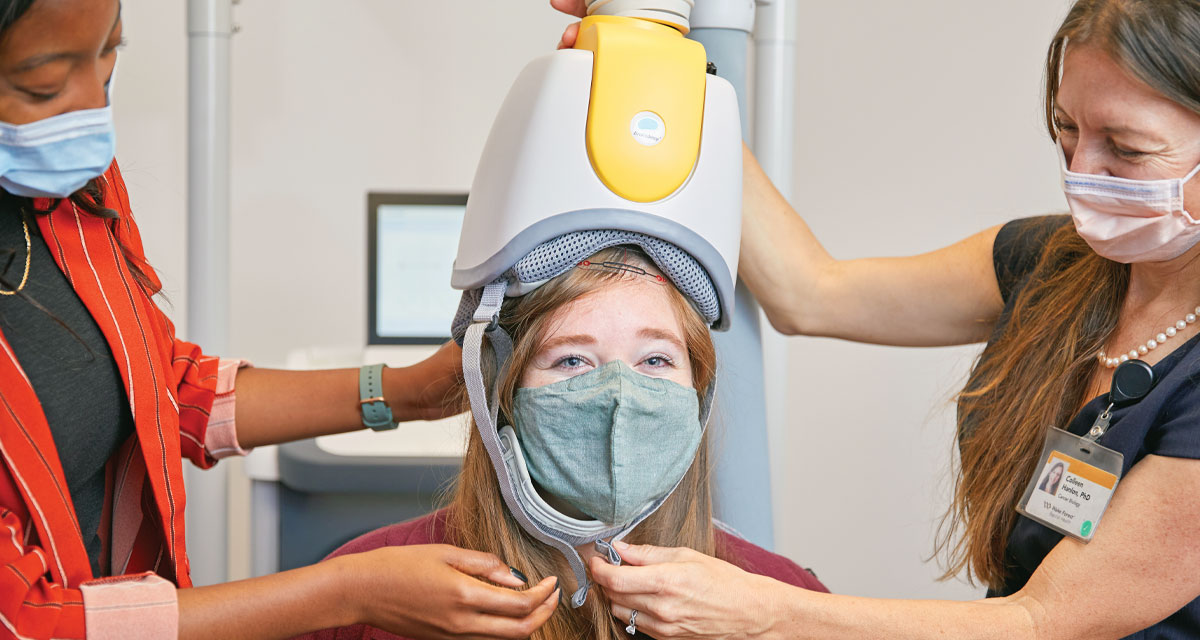The Innovation Quarter in Winston-Salem is one of the most vibrant and energetic areas of downtown. But what most of us strolling through Bailey Park don’t know is that the area is surrounded by groundbreaking medical research that might someday benefit us all.
One of these hidden gems is the Clinical Neuromodulation Lab, led by Dr. Colleen Hanlon, a professor in the Department of Cancer Biology at Wake Forest School of Medicine. She and her team have spent the last 10 years developing a brain stimulation tool to help community members decrease their use of cigarettes, alcohol, and other stimulants. They have demonstrated that, through a technique called Transcranial Magnetic Stimulation (TMS), it is possible to improve outcomes for these individuals.
Now, if you’re anything like me, you’re scratching your head right now with a quizzical look on your face. So, when I had the distinct pleasure of speaking with Dr. Hanlon, I asked if she could help me understand her important work in layman’s terms.
“We all have things that we crave that are not good for us when used in excess—food, shopping, social media, caffeine…,” she said. Sometimes we indulge in these vices and other times we are able to walk the other way. These 2 processes—like “Go” and “Stop” signals—are regulated by 2 circuits in our brain. If we are lucky, the circuits remain in a healthy balance. In this case, we can go about our daily lives using things in moderation. Occasionally however, the “Go” and “Stop” circuits are out of balance. This can lead to unhealthy behaviors, including excessive smoking or alcohol use.
Here’s the good news—Dr. Hanlon and her collaborators are currently leading an international effort to help push these circuits back into balance for people struggling with addiction. After receiving her Ph.D. in Neurobiology from Duke University in 2005, Dr. Hanlon became interested in the brain circuits involved in addiction. “At that point we knew a lot about the brain circuits that were not working properly, but there were no therapeutic tools available to help shift these circuits back into balance.” TMS has been FDA-cleared for use in treatment-resistant patients with major depression disorder since 2008. So, hungry for a new neuroscience-based approach to addiction treatment, Dr. Hanlon moved to the Medical University of South Carolina to learn from one of the pioneers of therapeutic TMS for depression.
Twelve years later, Dr. Hanlon and her team are leading several National Institute of Health supported clinical trials designed to evaluate unique forms of TMS as tools to decrease tobacco/cigarette use, excessive alcohol use, and stimulant use. They have delivered various forms of TMS to over 400 people struggling with various drug- and alcohol-related disorders. Even more exciting is that they are just one site in a community of laboratories across the world pursuing brain stimulation treatments for smoking and alcohol use disorder. In fact, a unique form of TMS was just FDA-cleared for use as a smoking cessation aid in 2020…perhaps one of the best silver linings of 2020!
Dr. Hanlon believes that TMS will soon transition to a viable treatment for many types of disorders, wherein these “Go” and “Stop” circuits are out of balance… including smoking, alcohol use, and stimulant use disorder. Their work in the Innovation Quarter is getting noticed far beyond the I-40 corridor! Dr. Hanlon’s work was featured in the lead story of the Sept 2017 issue of National Geographic (“How Science is Unlocking the Secrets if Addiction”) as well as in the Sept 2017 issue of Science magazine. Science.org has also endorsed Hanlon’s work with TMS in an article entitled “Zapping Cocaine Addiction” from 2017. Links for both articles along with a fascinating and informative video can be found at the end of this article.*
So, how can this work fit into your life or that of a loved one? If you have found yourself (or someone you care about) to be smoking a little more than usual, drinking a little more frequently, or using stimulants to get through the day, and you/they are looking to cut back, contact Dr. Hanlon’s team! All their research studies are confidential, free, and provide an invaluable service to our local community.
Please contact their team at [email protected] or call 336.713.7848 to learn more about their ongoing studies. More information about Dr. Hanlon can also be found at: https://school.wakehealth.edu/Faculty/H/Colleen-Ann-Hanlon
*Please enjoy coverage of her work at the following sites:
https://www.eurekalert.org/multimedia/668956
https://www.science.org/doi/full/10.1126/science.357.6355.960
https://www.science.org/doi/full/10.1126/science.357.6355.960



















